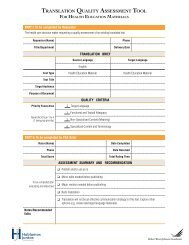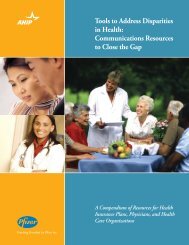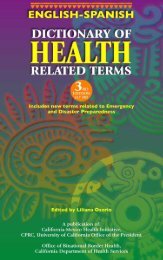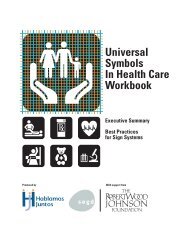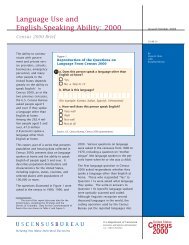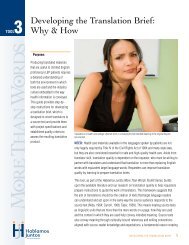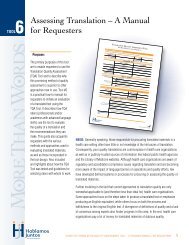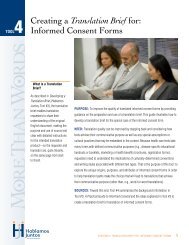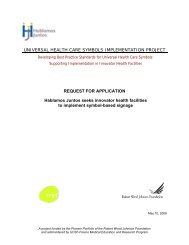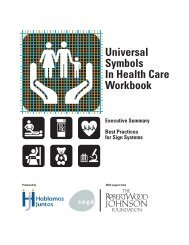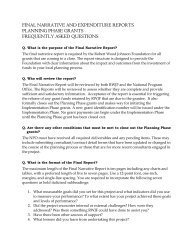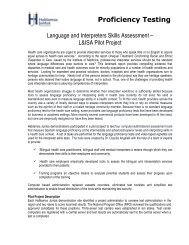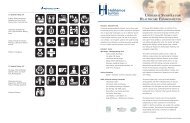Improving Access to Health Care for Limited ... - Hablamos Juntos
Improving Access to Health Care for Limited ... - Hablamos Juntos
Improving Access to Health Care for Limited ... - Hablamos Juntos
Create successful ePaper yourself
Turn your PDF publications into a flip-book with our unique Google optimized e-Paper software.
<strong>Improving</strong> <strong>Access</strong> <strong>to</strong> <strong>Health</strong> <strong>Care</strong> <strong>for</strong><strong>Limited</strong> English Proficient <strong>Health</strong> <strong>Care</strong> Consumers:Options For Federal Funding For Language Assistance ServicesApril 2003 Volume: 2 Issue: 1HEALTH...IN BRIEFPOLICY ISSUES FACING A DIVERSE CALIFORNIACali<strong>for</strong>nia is home <strong>to</strong> the most ethnically andlinguistically diverse population in the country.Approximately one out of every five Cali<strong>for</strong>nians– over six million persons – do not speak Englishvery well and are considered “<strong>Limited</strong> EnglishProficient.” <strong>Limited</strong> English Proficient health careconsumers experience barriers <strong>to</strong> obtaining highquality, timely access <strong>to</strong> health services.Studies have shown that without languageassistance services, such as medical interpretingand translation of written health in<strong>for</strong>mationmaterials, the quality of health care <strong>for</strong> such<strong>Limited</strong> English Proficient consumers suffers.Without effective health provider and patientcommunication in a language both canunderstand, there is an increased risk ofmisdiagnosis, misunderstanding about the propercourse of treatment and poorer adherence <strong>to</strong>medication and discharge instructions.Federal Legal Requirements <strong>for</strong>Language Assistance Services <strong>for</strong><strong>Limited</strong> English Proficient <strong>Health</strong><strong>Care</strong> ConsumersTitle VI of the Civil Rights Act of 1964 prohibitsdiscrimination on the basis of national origin byany recipient of federal funding. Federal courtshave ruled that Title VI prohibits discriminationbased on <strong>Limited</strong> English Proficiency. Today,almost all health care providers receive some typeof federal funding and must comply with Title VI.Executive Order 13166, issued by the Clin<strong>to</strong>nAdministration in 2000, affirmed the prohibitionagainst discrimination based on <strong>Limited</strong> EnglishProficiency and the requirement of equal access<strong>to</strong> federally funded health care and services <strong>for</strong>individuals with <strong>Limited</strong> English Proficiency. TheExecutive Order also applied the Title VIprotections <strong>to</strong> all federal departments andagencies themselves.The Bush Administration Department of Justicesupports Executive Order 13166 and hasinstructed all federal departments and agencies<strong>to</strong> continue its implementation. In June 2002, itfinalized its own Policy Guidance on Title VI andlanguage access. Although the Department of<strong>Health</strong> providers that receive federal funding maynot discriminate against <strong>Limited</strong> English Proficienthealth care consumers. Here in Cali<strong>for</strong>nia, there areother requirements <strong>for</strong> managed health care plans<strong>to</strong> provide culturally and linguistically appropriateservices. While many providers believe thatlanguage assistance services are costly, they oftenoverlook the costs of not providing such services asa result of decreased patient satisfaction, medicalerrors and avoidable complications (and increasedhealth care costs) arising from miscommunication.There are several options <strong>to</strong> obtain federalfunding <strong>for</strong> language assistance services. Thisbrief identifies policy options <strong>for</strong> Cali<strong>for</strong>nia thatwould allow the state, health plans and providers<strong>to</strong> maximize federal funding. This brief alsoprovides an in-depth analysis of how eight stateshave used federal funding <strong>to</strong> help implementlanguage assistance services <strong>for</strong> <strong>Limited</strong> EnglishProficient health care consumers (see insert).Counties with the Highest Percentages ofPeople with <strong>Limited</strong> English ProficiencyPercentage whospeak a languageother than EnglishPercentage whospeak English lessthan “very well”Cali<strong>for</strong>nia (statewide) 39.5 20.0Imperial County 67.8 34.3Los Angeles County 54.1 28.9Monterey County 47.3 26.8San Francisco County 45.7 25.0Merced County 45.2 23.4Tulare County 43.8 22.4Orange County 41.4 22.4Santa Clara County 45.4 22.0Fresno County 40.8 20.7San Mateo County 41.5 18.5<strong>Health</strong> and Human Services has also publisheda Policy Guidance on Title VI and languageaccess, as of the publication of this brief, it hasnot yet been finalized.In June 2002, the Bush Administration Center <strong>for</strong>Medicare and Medicaid Services issued a finalregulation <strong>for</strong> Medicaid managed care programsthat includes a requirement of linguistic accessthat incorporates Title VI.(continued next page)
ate scale). Although technical approval by CMS would berequired, the Cali<strong>for</strong>nia Department of <strong>Health</strong> Services(DHS) can add the billing code and estimated expensesas part of its annual Medicaid application submitted <strong>to</strong>CMS each November. No state legislation or other stateregula<strong>to</strong>ry authorization is required. However, the statemust demonstrate that it has budgeted <strong>for</strong> the nonfederalshare of the new expenses.Alternatively, the Cali<strong>for</strong>nia DHS could arrange <strong>to</strong> directlypay individual interpreters and transla<strong>to</strong>rs or languageservice agencies <strong>for</strong> language assistance servicesprovided <strong>to</strong> MediCal beneficiaries who are not enrolledin a managed care plan. Individual interpreters could beenrolled as MediCal providers or the state could contractwith language service agencies. Quality assurance <strong>for</strong>interpreter qualifications and skills could be overseen bythe state or by the contracted language service agency.It is important <strong>to</strong> note that even in counties withMediCal managed care, there are either individual healthcare consumers or types of medical services that are"carved out" and still reimbursed on a fee-<strong>for</strong>-servicebasis (e.g. certain children's services, certain long-termcare services, etc.).Policy Options <strong>to</strong> Ensure Language <strong>Access</strong>and <strong>to</strong> Maximize Federal Funding <strong>for</strong>Language Assistance ServicesThere are several options that would ensure languageaccess <strong>for</strong> Cali<strong>for</strong>nia’s <strong>Limited</strong> English Proficient healthconsumers and would maximize federal funding <strong>for</strong>language assistance services.• To ensure compliance with federal law and regulation,the Cali<strong>for</strong>nia DHS should issue a Medi-Cal Managed<strong>Care</strong> Policy Letter clarifying that Medi-Cal managed carehealth plans and providers are required <strong>to</strong> providelanguage assistance services within existing capitationrates. The Managed Risk Medical Insurance Board(MRMIB) should issue a similar clarification <strong>to</strong> theplans and providers participating in the <strong>Health</strong>yFamilies program.• DHS and MRMIB should offer technical assistance <strong>to</strong>managed care health plans and providers in trackingand analyzing the need <strong>for</strong> and costs of these languageassistance services.• The Cali<strong>for</strong>nia DHS should consider an enhancedcapitation rate <strong>for</strong> Medi-Cal managed care plans andproviders offering language assistance services <strong>to</strong><strong>Limited</strong> English Proficient health care consumers.Similarly, MRMIB should consider providing anenhanced capitation rate <strong>for</strong> plans and providersparticipating in the <strong>Health</strong>y Families Program.• The Cali<strong>for</strong>nia DHS should engage providers andinterpreters in determining the best method <strong>for</strong>reimbursing language assistance services in fee-<strong>for</strong>serviceMediCal. Options include establishing a billingcode and procedures <strong>for</strong> billing <strong>for</strong> language assistanceservices, contracting with language services agencies, orcontracting directly with interpreters.• The Cali<strong>for</strong>nia DHS and MRMIB should explore morecost-effective and efficient mechanisms <strong>to</strong> ensure theprovision of language assistance services, including butnot limited <strong>to</strong>, state-funded and state-operatedinterpreter and translation services.
The Cali<strong>for</strong>nia Endowment’s Initiative <strong>to</strong>Ensure <strong>Access</strong> <strong>to</strong> <strong>Care</strong> <strong>for</strong> <strong>Limited</strong> EnglishProficient <strong>Health</strong> <strong>Care</strong> ConsumersSince 1999, The Cali<strong>for</strong>nia Endowment has invested morethan $15 million <strong>to</strong> support equal access <strong>to</strong> health care <strong>for</strong><strong>Limited</strong> English Proficient health care consumers inCali<strong>for</strong>nia. The Cali<strong>for</strong>nia Endowment’s ef<strong>for</strong>ts have focusedon three key strategies:<strong>Improving</strong> the training and professionalization ofmedical interpreters.Grants have supported the development ofinterpreter training curricula <strong>for</strong> communitycolleges and community-based organizations, thedevelopment of standards of practice by theCali<strong>for</strong>nia <strong>Health</strong>care Interpreters Association, andthe development of language proficiency tests <strong>for</strong>bilingual providers.Strengthening applied research and evaluation oflanguage assistance services.Grants have supported the evaluation of remotesimultaneous medical interpretation and videoconferencingmedical interpretation technologies,the development of <strong>to</strong>ols and processes <strong>for</strong>translation of written materials, and thecommissioning of several studies on languageassistance services in Cali<strong>for</strong>nia.Promoting policy and health delivery systems change<strong>to</strong> ensure language access.Grants have supported the moni<strong>to</strong>ring ofcompliance with current federal and Cali<strong>for</strong>nialaws and regulations regarding language access,analysis of policy options <strong>to</strong> finance languageassistance services, convenings of a MedicalLeadership Council on Language <strong>Access</strong>, and theconducting of a social marketing campaign inpartnership with ethnic media focusing on<strong>Limited</strong> English Proficient health consumers.Thanks <strong>to</strong> John Dufner (Minnesota), Peter Ezzy (Maine),Lloyd Forbes (Idaho), Joyce Gaufin (Utah), Nora Guzman-Dyrseth (Washing<strong>to</strong>n), Lynette Honbo (Hawaii), Lucinda Reid(New Hampshire), Tim Roth (Washing<strong>to</strong>n), and JacklynnThiel (Montana), who provided valuable in<strong>for</strong>mation on theirrespective state programs.Special thanks <strong>to</strong> Vivian Huang from the Cali<strong>for</strong>nia Primary <strong>Care</strong>Association and Mara Youdelman from the National <strong>Health</strong> LawProgram <strong>for</strong> conducting background research about the statemodels and <strong>for</strong> their helpful edi<strong>to</strong>rial comments.Prepared by Ignatius Bau, The Cali<strong>for</strong>nia Endowment andAlice Chen, <strong>for</strong>mer <strong>Health</strong> Policy Scholar in Residence at TheCali<strong>for</strong>nia Endowment and currently Soros PhysicianAdvocacy Fellow at the Asian and Pacific Islander American<strong>Health</strong> Forum.This publication was supported in part by a grant from theMedicine as a Profession Program of the Open Society Institute.<strong>Health</strong> ...In Brief is a publication of The Cali<strong>for</strong>niaEndowment. No part of this publication may bereproduced without attribution <strong>to</strong> The Cali<strong>for</strong>niaEndowment. To obtain additional copies, or <strong>to</strong>request a copy be sent <strong>to</strong> a colleague or associate,please contact us at:info_publications@calendow.orgwww.calendow.orgor call800-449-4149, ext. 3513(Please specify electronic or printed version.)The Cali<strong>for</strong>nia Endowment21650 Oxnard St., Suite 1200Woodland Hills, CA 91367Established by Blue Cross of Cali<strong>for</strong>niaCMPA / PBLA 04/03
MontanaMontana reimburses <strong>for</strong> language assistance servicesprovided <strong>to</strong> eligible Medicaid and State Children’s<strong>Health</strong> Insurance Program recipients in conjunctionwith an otherwise covered medical service. Clients inboth the fee-<strong>for</strong>-service and Primary <strong>Care</strong> CaseManagement Medicaid program are eligible <strong>for</strong>language assistance services.The provider is responsible <strong>for</strong> arranging <strong>for</strong> a qualifiedinterpreter, who is defined as “a person who speaksEnglish and another language fluently…. Fluency includesan understanding of nonverbal and cultural patternsnecessary <strong>to</strong> effectively communicate in that language.”There are no <strong>for</strong>mal measures of qualifications.Both the provider and interpreter must attest that theinterpreter is qualified <strong>to</strong> provide medical interpretation,and must sign and date an invoice <strong>for</strong> submission <strong>to</strong> thestate. The state then reimburses the interpreter directly.Client family members and paid employees of the medicalprovider are not eligible <strong>for</strong> reimbursement.MinnesotaIn 2001, Minnesota began <strong>to</strong> reimburse its fee-<strong>for</strong>-serviceproviders, with the exception of inpatient hospitals, <strong>for</strong> thecost of interpreters under the state’s Medicaid program.Providers arrange and pay <strong>for</strong> interpreting services inconjunction with a covered medical service; writtentranslations and appointment scheduling are not covered.The providers can then bill the state the lesser of actualcharges or $12.50/quarter hour.There are no qualifications or standards <strong>for</strong> training,competency or ethical conduct of interpreters. However,client family members cannot serve as paid interpreters.There is no reimbursement <strong>for</strong> bilingual providers or staffinterpreters. Managed care organizations are required <strong>to</strong>provide oral interpretation services <strong>to</strong> their enrollees undertheir current state contracts; many have establishedrelationships with interpreting agencies <strong>to</strong> providelanguage assistance services <strong>to</strong> their enrollees.Eligible interpreters are reimbursed at the lesser rate of$6.25/quarter hour or the usual and cus<strong>to</strong>mary charge.Payment <strong>for</strong> travel or wait time is not permitted;interpreters are also not paid <strong>for</strong> “no-show” appointments.Interpreters are allowed <strong>to</strong> bill <strong>for</strong> one quarter hour perclient per day <strong>for</strong> time spent outside the provider office,specifically <strong>to</strong> exchange health care in<strong>for</strong>mation, <strong>for</strong>example, regarding medication use.



